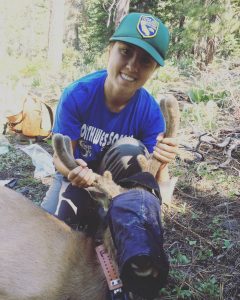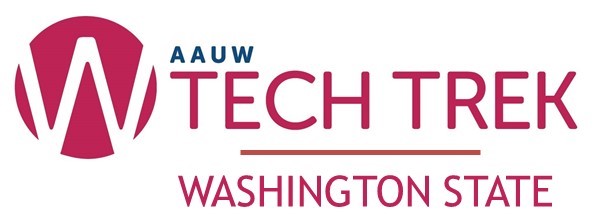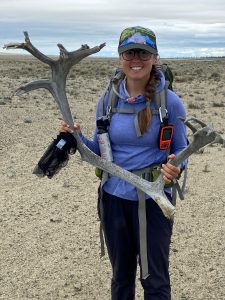- Science
Tell us what you do in your profession.
As a wildlife biologist my job consists of monitoring and researching wildlife populations. I examine the health of the population, the health of their habitat, and ensure they are thriving and adapting to the changing climate and environment.
How did you end up in your career?
As a child I had a passion for the outdoors and animals. That passion was further explored during my middle school years. My science teacher made learning exciting and she created many outdoor adventures for us to participate in, including class field trips, sailing/marine labs, and overseas expeditions to the Peruvian Amazon and to Thailand.
What advice would you give to a girl going in to 8th grade who loves STEM?
Ask LOTS of questions! Continue to explore all parts of STEM because you will find something that truly inspires you. Continue to stay curious and pursue anything and everything that sparks an interests. As humans we still have SO much to learn about this world and beyond. You could be the next person to make a great discovery! A career in science and math is unlimited in possibility!
What would you do differently?
While I am extremely happy with my career there are things I could have done differently to set myself up for success earlier and easier. I do not think schooling defines intelligence or that good grades equals success but I do think it is important to understand that the effort you put in the classroom can greatly contribute to giving you the career you want and deserve. The effort and passion you put forth in you STEM classes will carry over into your job and ultimately the success of your career. Learn how to challenge and discipline yourself now and those skills will separate you from the pack :). I wish I had learned those skills at an earlier stage in life.
Is there anything you wish you had studied that you did not?
I wish I had minored in GIS and taken more environmental stats classes. Wildlife careers starts with manual labor seasonal field jobs. These jobs can be extremely difficult but mostly rewarding. Hiking outside everyday while getting paid is not a bad gig. But its not until you start climbing the ladder (which generally takes 3-5 years of field gigs) to start doing things beyond gathering field data. Mapping, analysis, project coordination, etc. The one stats class you took 5 years ago does not prepare you to analysis an entire project with 2 years worth of data. GIS skills are incredibly useful in lots of careers and I encourage everyone to minor in GIS no matter what they’re studying.
Other STEM positions she has had
- Environmental education and watershed conservation
What does _________ Job ____ mean?
Depending on the specialty, a wildlife biologists job can vary. I specialize in population studies of large mammals. I try to monitor and manage large mammal populations through consistent data collection and contributing to policy and regulation.
What kinds of things do you do each day?
I spend half my time at a desk and half my time in the field collecting data. Data collecting can include but is not limited to; running transects for fecal collection, deploying game cameras, and capturing animals for collaring and other biological information. At my desk I am analyzing data, mapping study sites, coordinating the everyday efforts of projects, and writing reports to inform policy and regulation.
Education (colleges & Degrees; additional certifications):
- BS from the University of Vermont, California Naturalist, and Wilderness First Aid
Notable accomplishments
Contributed to the discovery of a species. Proved that by using advanced DNA extraction technology migrating deer herds can be more accurately monitored compared to previous aerial methods. Currently part of a statewide population project that will set the standards as to how mammalian population projects will be structured, organized, and conducted.
Anything else you would like to share?
Never stop exploring!

